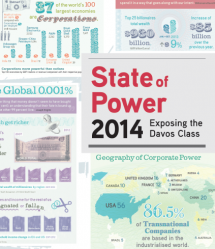State of Europe: How the European round table of industrialists came to wage class war on Europe
Regiones
The convergence of corporate, financial, intellectual, political and ideological elites interconnected through board memberships of companies, banks, policy groups, think tanks, foundations, advisory groups and forums has led to what billionaire Warren Buffet referred to as a ‘class war” in which “my class, the rich class, that’s making war, and we’re winning.” In the European Union, it is their choices that are largely reflected in the merciless austerity measures spreading poverty and unemployment as healthcare, education, social services, welfare and social housing are dismantled; as resources and assets are privatized, workers fired, pensions and social security are cut, workers have their rights and benefits dismantled, and the population is pushed into desperation. It is why the struggle for a different Europe must start first with tackling and undermining the power of those waging this war.

Descargas
Autores
Founded in 1983, the European Round Table of Industrialists (ERT) quickly became – and today remains – one of the most influential voices of organized corporate interests in Europe. Not quite a lobby, not quite a think tank, the ERT is an action-oriented group made up of roughly 50 CEOs or Chairmen of Europe’s top industrial corporations who collectively push specific ideologies, pressure political elites, and plan objectives and programs designed to shape the European Union and the ‘common market’.
The past thirty years of the ERT’s existence has revealed it one of the most influential organizations in Europe, widely known to the EU’s political, technocratic, and financial elites, holding regular meetings, dinners, and social events with prime ministers and cabinet officials of EU member states, as well as the leadership of the European Commission itself. In the wake of the European debt crisis of the past several years, the ERT has again been at the forefront of shaping the changes within the EU, promoting austerity and structural reforms as the ‘solution’ to the debt crisis.
As through their three-decade history, the Round Table today continues to promote the ideologies and interests of corporate and financial power at the expense of the interests of labour and the population more widely. This paper aims to examine this highly influential group in order to shed some light on an organization very well known to those who make the important decisions within the EU, yet largely in the shadows to those who have to suffer the consequences of those decisions.
